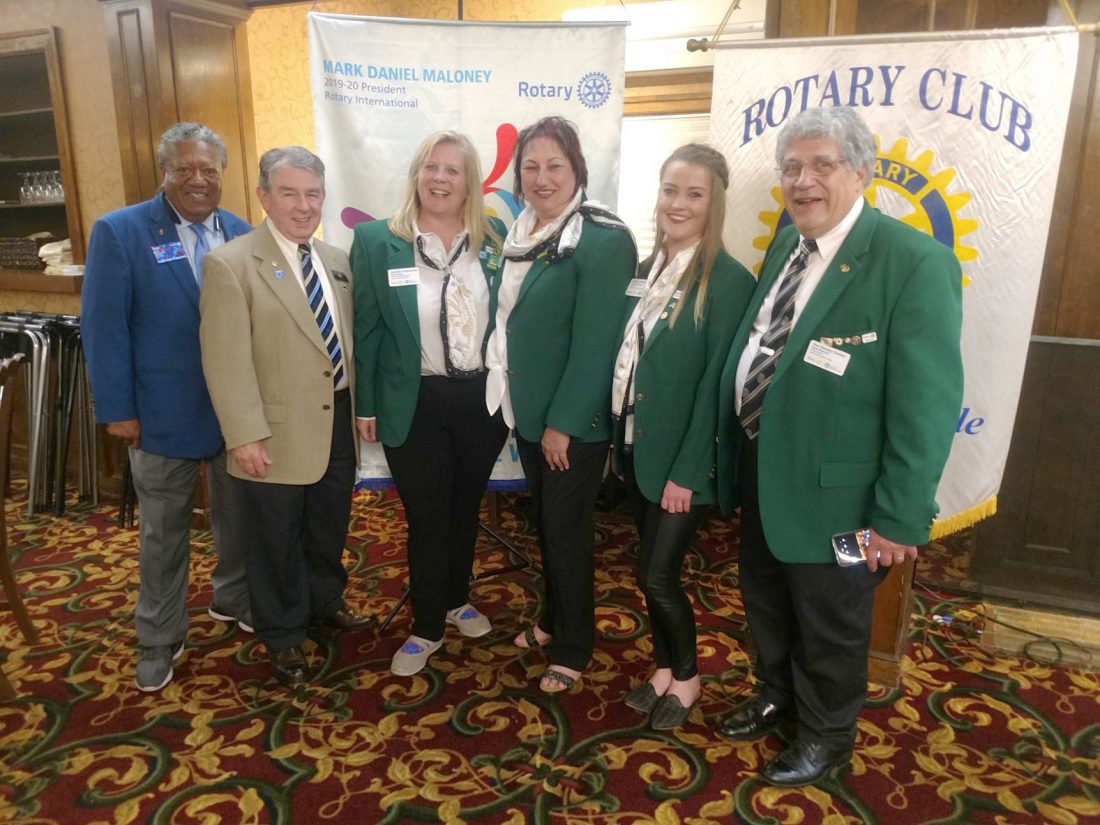This presentation was given on Sept. 10 at the Shorewood Country Club in Dunkirk to an audience of 35 Rotarians and guests. Rotary District 7090 Governor Bob Artis, a member of the Rotary Club of Clarence, was present. The program was arranged by Dan Smith, Rotary District VTT Chair and Westfield-Mayville Rotary Club Youth Services Chair. This VTT experience in Brazil was funded by Rotary District 7090.
The VTT members were Jennifer Schoenhals, RPh, who was the team leader; Anna-Marie Wysynski, MD; Claire Harkness, RPN; and Thomas Gerbasi, MD. Schoenhals is a member of the Niagara Falls Sunrise Rotary Club. She has been a pharmacist for nearly 35 years, owns a pharmacy, has expertise in compounding, and is the creator of several customized medications. Wysynski, a non-Rotarian from Burlington, ON, is the Medical Director at Vitality Anti-Aging Center. As a general practitioner, she is knowledgeable in all areas of medicine. For 15 years she has been an emergency physician at Alexandra General Hospital practicing allopathic medicine, and she also is experienced in integrative medicine.
Harkness is an RPN at Juravinski Hospital in Hamilton, ON, which specializes in treating all forms of cancer. She is a member of the Rotaract Club at McMaster University, and she is enrolled in full-time studies to obtain her Bachelor of Science in Nursing. Gerbasi, who is a member of the Rotary Cub of Lewiston-Niagara on the Lake, retired in July 2018 after a 40-year career as a pediatrician. In addition to pediatrics, Gerbasi’s experiences included teaching medical students, ophthalmological disease, and treating children with cancer and also congenital heart disease.
Dan Smith, Rotary District 7090 VTT Chair, stated, “We are pleased with the successful VTT trip to the Sao Paulo Rotary District 4480, which hosted our team. Our team members were given opportunities to experience the expertise of the Brazilian world-renowned medical facilities and personnel in the areas of cancer, ophthalmology, and coronary procedures. Achieved goals included sharing best practices, research, helping others, and improving the quality of life. This team is currently sharing their many experiences of their Brazil trip with numerous Rotary clubs, including the Westfield-Mayville, Dunkirk-Fredonia, Greater Jamestown AM, and Jamestown Rotary Clubs in our area.”
While in Brazil, the VTT visited many hospitals and medical centers, participated in television and radio interviews, and attended several Rotary club meetings and a Rotary district conference. Also, team members stayed in the homes of host families, and were given various cultural opportunities.
During their Sept. 10 presentation, the four VTT members took turns offering highlights of their experience and insights into the medical industry in Brazil. Team member Wysynski, who spoke about the area of ophthalmology, said, “In Brazil there is a higher incidence of childhood glaucoma than in Canada. This is what caused the blindness of the famous Italian singer Andrea Bocelli. Canadians have a higher rate of cataracts. In the U.S. the most common causes of blindness are diabetic retinopathy and cataracts. Also, in North America we have ophthalmologists, optometrists, and opticians. However, in Brazil there are only ophthalmologists.”
Wysynski said, “I noted four significant differences between the Brazilian and Canadian medical industry. First, in Brazil there is a practice of humanized care. They have us beat in terms of patient care. Second, there is a higher possibility of Brazilian individuals being able to conceive and realize their potential for opening successful practices than Canadians. Third, a family-like atmosphere is endorsed among staff members in medical facilities. There is a greater level of staff appreciation. Lastly, Brazilians dial 192 instead of 911 in case of emergencies.”
Team member Gerbasi discussed the area of cardiology. He said, “In the medical facilities we visited in Brazil, we noticed how staff members were so very caring. Also, Brazil is still dealing with rheumatic heart disease, which is prevalent. The problem is with early detection. Brazilian primary care doctors do not necessarily pick up on early issues. Coronary heart disease is a big issue. One of the reasons is diet. Folks there tend to eat bread and cheese for breakfast, an enormous lunch of rice and beans, and a very late dinner. Meat, meat, and more meat are always on the menu. Very few leafy greens and vegetables are eaten. Another contributing factor is the consumption of high amounts of sugar, which leads to high blood pressure and high cholesterol.” Gerbasi added that public smoking has almost been completely eliminated in Brazil. Also, he said that there is a serious lack of ambulances.
Harkness, another VTT member, spoke about cancer care in Brazil. She noted that there are hospitals which specialize in cancer treatments, and there are mobile trucks and units which help with preventative cancer screenings. Harkness said, “I think the way Brazil approaches healthcare is tremendous. Hospitals there let you know everything. The patient is greatly informed along the way. In Canada I’m trained to not disclose testing numbers. What stood out the most for me is that the patient is given all of the information in order to help decrease anxiety and stress about the diagnosis and the disease of cancer. What we saw over and over again is humanized care. They treat the person, not the illness.”
VTT leader Schoenhals said that the team visited 11 hospitals in 18 days. She noted, “Hospitals post their statistics outside of their buildings for the public to see. The approach in Brazil to patient care may be summarized by the following quote made by Cicely Saunders, an English doctor, nurse and social worker who was noted for her work in terminal care research and her role in the birth of the hospice movement and subsequent palliative care. ‘Do not give days to a patient’s life, but give life to a patient’s days.'”
Schoenhals said that the team also went to Rotary club meetings and a Rotary district conference, were featured in four newspapers, attended a city council meeting and were interviewed on both television and radio. They visited 12 sites and had time for socialization, including taking a samba class. During their stay in Brazil, VTT members learned a great deal about the medical industry in Brazil, and established personal connections with industry professionals and their host families.
For more information about this Vocational Training Team’s May 2019 experience in Brazil, visit “VTT 7090 to Brazil 4480” on Facebook.


